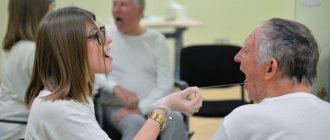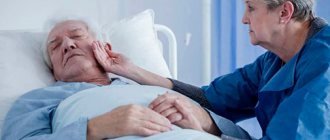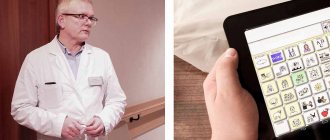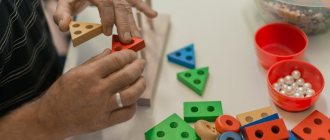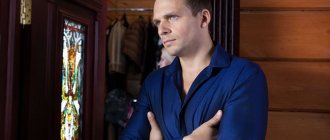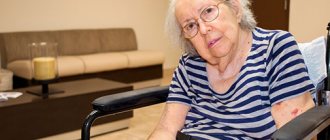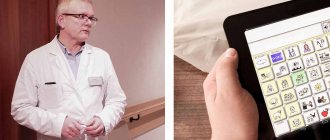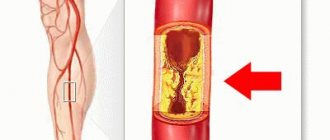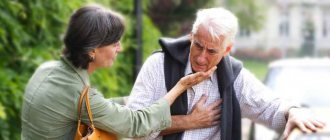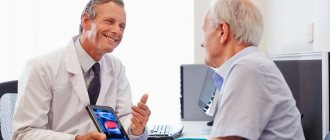Return to work
The negative impact of a stroke on the patient’s condition depends on how severe the disruption of blood circulation in the brain was during the stroke and on the source of the lesion - the more the brain is damaged, the stronger the disturbances in mental, intellectual, motor and motor functions will be.
As a rule, the restoration of speech, motor and visual functions occurs gradually - the first improvements appear already after three days after the stroke.
But we must not forget that rehabilitation is a long process, and if you give the body a load too early, there is a risk of another stroke.
The patient's involvement in work activity should be gradual. After discharge and completion of the main recovery process, it is better to switch to a reduced schedule or switch to working from home.
Important! In order to accustom your body to work, you can start working a little in the country. This way, moderate physical force is used and the body gains endurance.
What should dad do after a stroke?
4. Guest
| 26.06.2014, 18:47:13 [1493097506]
My husband had an ischemic stroke more than a year ago, also on the left side, he is 39 years old, he was treated for a long time, first intensive care, then hospital and 3 weeks in a sanatorium, then more than 3 months on sick leave and returned to work, got behind the wheel after 3 months . After his illness, it was hard for him at work, especially for the first half of the year. Now he’s more or less used to it, but he’s become more tired and has a headache.
What the doctors told us; the recovery period after a stroke is very important, that it will recover in 1-2 months (this is about mobility), we need to actively do exercise therapy, occupational therapy (developing fine motor skills), massage, daily walks, and of course, constant taking tablets that thin the blood and improve blood circulation + droppers (Actovigil, Cytoflavin.) generally as prescribed by the doctor.
Your father is still young, young people recover better and faster, but after 60, complete recovery is rare.
Good luck and health to your dad! The main thing is not to get depressed, otherwise this often happens after an illness, my husband cried constantly for the first months, although this is not typical for him at all, we had a very long and difficult recovery, we need patience, willpower and the support of loved ones
When can you start working?
As a rule, the minimum rehabilitation period after an ischemic stroke is three months, after a hemorrhagic stroke - six. If the doctor and examination have determined that the consequences of the blow have been completely eliminated , you can go to work.
For some patients, rehabilitation takes years. In this case, the patient is assigned a disability, which implies either the inability to work at all, or a transition to easier work that is not associated with nervous overload.
In any case, whether a person can go to work or whether it is worth continuing treatment is decided only by the attending physician.
Assessing the possibility of returning to work
After the first stage of rehabilitation, doctors and the patient themselves determine whether such serious consequences remain as:
- disturbance of speech perception - does the patient understand the speech addressed to him, can he independently read and understand the meaning of what he read;
- loss of coordination;
- absent-mindedness, inattention;
- partial or complete loss of hearing or vision;
- difficulty swallowing food or drinks;
- impairment of motor activity.
If at least two of the listed symptoms do not disappear, there can be no talk of returning to work.
Prevention of infectious diseases
People after a stroke are limited in their movements and spend most of the day in a forced horizontal position. Danger – the likelihood of developing bedsores. They manifest themselves as areas of inflammation on the skin of the back, lumbar and sacral regions, followed by tissue atrophy.
To prevent it, it is necessary to turn it on its side every 2 or 3 hours, carry out wiping, and hygiene procedures. Changing body position should be smooth, without sudden movements, so as not to damage the skin. Any wound surface is an open gate for infectious agents. The body's protective properties are sharply reduced, any inflammation develops quickly and violently.
Additionally, beds equipped with an anti-decubitus system help. These models are based on forced air circulation in the mattress under pressure. As a result, the points of contact between the bed and the body are constantly changing. It creates the feeling of a soft, pleasant massage. Modern models do not create noise and do not disturb sleep. With the help of such mattresses, the frequency of manual movement is reduced. The boarding house is equipped to care for the elderly after a stroke.
The provision of clean bed linen should be strictly monitored. You need to make the bed carefully, without folds, because they create friction and cause local inflammation. For the same reason, staff and the patient’s nails should be cut short to prevent scratches.
It is recommended to choose loose-fitting clothing, without tight seams, buttons, or zippers. Dense, tight options lead to increased heating of the body, compression and impaired blood circulation. It is advisable to use natural fabrics (not synthetic) so that a contact allergic reaction does not occur, which is extremely difficult to stop later.
The main condition is to maintain clean skin. To do this, use special disposable wipes with ph-neutral agents. It is better to exclude antibacterial components (wipes, soap, spray). After hygiene procedures, you should use a soft towel and moisturizer.
If incontinence is present, then you should change your underwear more often. If necessary, use diapers for adults, which are convenient to change. In case of increased sweating, treat the skin with a diluted solution of apple cider vinegar.
The room needs to be regularly ventilated and quartzed to prevent infection. Wet cleaning is mandatory in the wards. Mandatory wet cleaning is carried out in the wards every day.
In order to prevent pneumonia, inhalers and breathing exercises are used: 1. Restoring ventilation of the lower parts of the lung fields, preventing respiratory failure and blood congestion - fill a glass with water, lower a straw into it. In this position, blow into it. 2. Improving the functioning of the chest muscles, improving mood - inflating a balloon. 3. Ensuring uniform excursion of the lungs - moving the hands behind the head (inhalation), returning to the body (exhalation). 4. For 40 seconds, 5 sets each, alternate between deep, calm inhalations and exhalations without holding your breath.
With prolonged exposure to a horizontal position, congestive changes in the lungs develop, leading to hypostatic pneumonia. Inflammation is dangerous due to accompanying changes in the pleural cavities (pleurisy), in the heart sac (pericarditis).
Passing a medical labor examination
The examination involves a complete examination of the patient who has suffered a stroke in order to prepare a medical report on several points:
- can a person go to work now or does sick leave need to be extended;
- if the patient is ready to work, under what conditions can he perform it;
- start date of employment;
- possibility of disability.
The examination is carried out, as a rule, by several doctors - a therapist, a neurologist, a cardiologist, and an ophthalmologist. All previously obtained ultrasound or MRI results are collected, the patient undergoes tests, is interviewed by doctors, and the neurologist conducts standard tests for reaction and memory.
Important! It is imperative to obtain an opinion from an eye doctor - after an impact, vision can be greatly impaired, so it will be impossible to return to some professions.
What doctors check first:
- Have your mental abilities been restored?
- psychological condition;
- to what extent visual and speech functions are impaired;
- muscle tone;
- state of the cardiovascular system;
- Are there any coordination problems?
If the consequences of a stroke are minor, the VTE issues a work permit. In some cases, if the patient has not fully recovered, but is ready to start work, the commission and the employer may offer an easier employment option:
- reduced working hours (for example, half the rate);
- transfer to another position with easier working conditions;
- transition to working from home or on an individual schedule (for example, every other day).
Note: If the condition of a person who has suffered a stroke does not allow any complex activity and his health is severely compromised (for example, some brain functions have not fully recovered, vision or hearing is severely impaired, limbs are partially or completely paralyzed), then VTE may not issue a work permit and recommend the patient apply for disability.
What job can you not return to?
Even if the medical commission has recognized the person’s readiness to begin professional activity, it is necessary, in order to avoid a second blow or complications, to exclude the presence of harmful factors in the profession or at the workplace, such as:
- greatly increased or decreased air temperature;
- working for a long time on your feet or in one extremely uncomfortable position;
- the presence of stress, the possibility of physical fatigue;
- interaction with harmful, toxic substances.
That is, heavy physical labor, work as a truck or bus driver, managerial positions associated with constant stress, work as an industrial climber or foundry worker in a workshop become unavailable to patients - at least for several years after a stroke.
For example, it is possible to work as a watchman after a stroke, because it does not require much effort. But the position of a security guard, for example, in a store, is contraindicated: you need to stand on your feet for a long time and be very attentive.
Important! There is no need to rush to return even to light work, which is in one way or another associated with increased psychological stress . Any stress can cause a jump in blood pressure, which will trigger another stroke.
Speech restoration
One of the consequences of ischemic or hemorrhagic cerebrovascular accident is the inability to reproduce articulate sentences (with severe damage to the central vessels) or slurred, unrelated muttering (against the background of a smaller stroke localized in the basin of the terminal branches of the feeding arteries). At the same time, hearing remains intact.
Time is of the essence. The sooner activities are started, the greater the likelihood of a positive outcome. Based on practical data, the most pronounced effect is achieved in the first year, subject to active work.
This is an exclusively joint activity - the patient, relatives and an experienced qualified speech therapist. Close people can provide initial assistance. To do this, they need to communicate, tell the news, engage him in conversation, ask questions, do not leave them unanswered, do not rush him, because he is learning to speak again. It is difficult to understand a person after a stroke due to slurred speech, but only through joint efforts can it be restored.
The specialist selects techniques aimed at improving the functioning of the speech apparatus:
- An exercise that actively involves the lips and tongue.
- Using cards with words and pictures.
- Pronunciation of words by syllables.
- Listening to music, playing songs.
- At later stages - adding tongue twisters.
You should exercise every day; you should not expect quick results. The BOARDING HOUSE for bedridden people employs specialists from various clinical areas. In particular, the staff has a speech therapist who helps to regain the ability to speak lost due to illness.
Depression
Patients who have suffered a cerebral hemorrhage are very often susceptible to severe depression or apathy.
A person cannot come to terms with the fact that things that he used to do with ease (for example, driving a car, working on a computer, cooking or the usual morning jogging) become inaccessible or are given with great difficulty.
Important! If there is no support from loved ones, then thoughts about one’s own uselessness and the consequences of the blow - decreased vision, physical weakness, impaired coordination and memory - lead to severe depressive conditions.
The patient may refuse not only work, but even rehabilitation, which will inevitably lead to a worsening of the condition and further disability.
We invite you to watch a useful video on the topic:
